Huguette Duflos (1887-1982) was a prolific leading lady of the French silent cinema of the 1920s.

Italian postcard by Ed. Traldi, Milano, no. 858.

French postcard in the Les Vedettes de Cinéma series by A.N., Paris, no. 16. Photo: Reutlinger.

Postcard by A.N., Paris, no. 155. Photo: V. Henri. Perhaps a card referring to Duflos' role as Princess Olga in La princesse aux clowns (André Hugon, 1924).

German postcard by Ross Verlag, no. 47/2.Photo: Bruckmann-Verleih / Robert Wiene-Produktion der Pan-Film A.-G., Vienna. Huguette Duflos and Jaque Catelain in the Austrian silent film Der Rosenkavalier (Robert Wiene, 1925), adapted from the opera by Richard Strauss with a libretto by Hugo von Hofmannsthal.
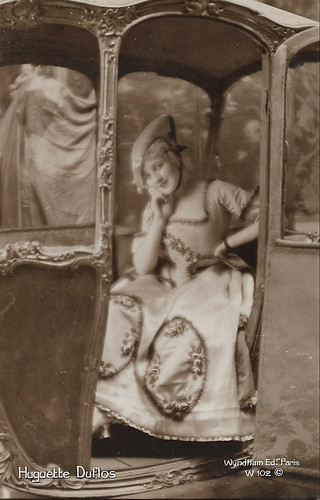
French postcard by Wyndham Ed., Paris, no. W 102.
Huguette Duflos was born Hermance Meurs in Limoges, France, in 1887. She studied acting at the Conservatoire in Paris, first with Leloir, then with Raphaël Duflos. She married Duflos in 1910 and they divorced in 1928.
In 1912, she started to play at the Comédie Française. From 1915 on she was a Pensionnaire and had bigger roles.
However, when film director Henry Pouctal offered her a role in his film L'Instinct/The Instinct (1916) starring Raphaël Duflos, she eagerly accepted despite protests by her stage colleagues.
Eight years before, she had already made her film debut in the legendary Film d'art production L'assassinat du duc de Guise/The Assassination of the Duke de Guise (André Calmettes, Charles Le Bargy, 1908).
Her radiant youth, her expressive charme and her photogenic qualities were appreciated and would turn her into one of the most prolific stars of the French silent cinema.

French collector card (minicard) for Chocolat Félix Potin, third series, 1922. Photo: Reutlinger.

French postcard in the series Nos artistes dans leur loge by Editions La Fayette, Paris. Photo: Comoedia.

French postcard by A.N. (A.Noyer), Paris, no. 10. Photo: Henri Manuel. Caption: Huguette Duflos de la Comédie Française.

French postcard by Edition des Studios-Rahma, Paris. Photo: Huguette Duflos as Fleur-de-Marie in Les Mystères de Paris/The Mysteries of Paris (Charles Burguet 1922).

Italian postcard, no. 671. Photo: Huguette Duflos in Koenigsmark/The Secret Spring (Léonce Perret, 1923). Collection: Didier Hanson.
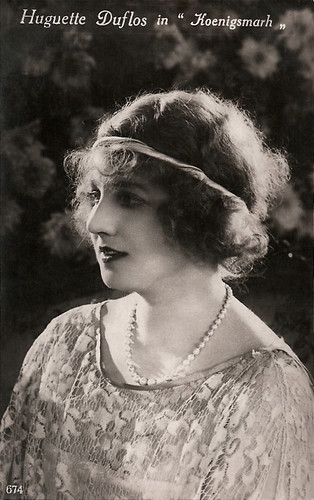
Italian postcard by A. Traldi, Milano, no. 674. Photo: Huguette Duflos in the silent film Koenigsmark (Léonce Perret, 1923).
French postcard.
Huguette Duflos played in many films, from L'Ami Fritz/Friend Fritz (René Hervil, 1919) to Travail/Work (Henri Pouctal, 1919) with Léon Mathot, from Mademoiselle de la Seiglière (André Antoine, 1921) to the 12-part serial Les Mysteres de Paris/Mysteries of Paris (Charles Burguet, 1922).
Duflos magnificently performed the Grand Duchess Aurora in Léonce Perret's opulently staged Koenigsmark/The Secret Spring (1923), based on Pierre Benoit's popular novel and co-starring Jaque Catelain, Marcel L'Herbier's fetish-actor.
They played together again in Der Rosenkavalier/The Knight Of The Rose (Robert Wiene, 1925), which lifted her to international stardom. A huge success was Julien Duvivier's L'Homme à l'Hispano (1927), in which she is the rich lady who falls for a man who is ruined but has borrowed a fancy car.
At the advent of the sound era, Duflos went to the States to play opposite Charles Boyer in Le Procès de Mary Dugan (Marcel de Sano, 1931), the French version of The Trial of Mary Dugan (1930).
She also played in two early sound films by Marcel L'Herbier: Le mystère de la chambre jaune/The Mystery of the Yellow Room (1930) and Le Parfum de la dame en noir/Scent of the Woman in Black (1931). In the mid-1930s, she did only a few films. She rather played on stage in revues and comedies.

French postcard in the Les Vedettes du Cinéma Series by Editions Filma, no. 5. Photo: Films Eclipse.
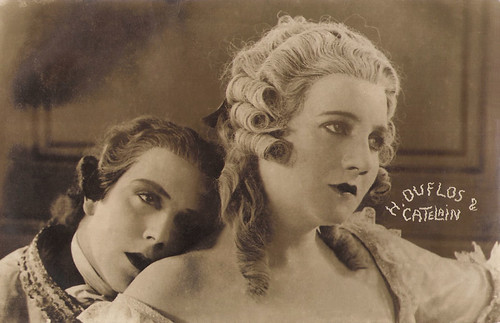
Vintage postcard. Huguette Duflos and Jaque Catelain in Der Rosenkavalier (Robert Wiene, 1925).

French postcard by Europe, no. 188. Photo: Film Aubert. Huguette Duflos and Léon Mathot in the silent film drama Yasmina (André Hugon, 1927).

Italian postcard by Edizione E.F.A., A. Traldi, Milano, no. 949. Photo: Huguette Duflos in the French silent film drama Palaces (Jean Durand, 1927), released in Italy as Palace.

Italian postcard by Edizione E.F.A., A. Traldi, Milano, no. 950. Photo: Huguette Duflos in Palaces (Jean Durand, 1927).
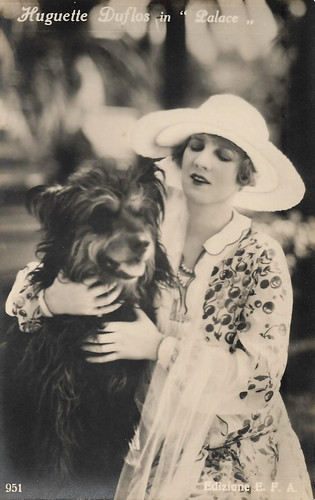
Italian postcard by Edizione E.F.A., A. Traldi, Milano, no. 951. Photo: Huguette Duflos in Palaces (Jean Durand, 1927).
In the late 1930s and early 1940s, Huguette Duflos played again several film roles, such as Queen Hortense in Les Perles de la couronne (Sacha Guitry, Christian-Jacque, 1937) with Jacqueline Delubac.
Most of Huguette Duflos' sound productions were commercial mainstream films. One wonders what would have happened if she had had directors then like Abel Gance or Marcel L'Herbier who had guided her during the silent days?
A glimpse of that can be noticed in her sound film Maman Colibri (1937) with Jean-Pierre Aumont. In this film directed by the talented Jean Dreville, Duflos plays a woman in her forties who is deluded in life. She falls in love with a friend of her son, but he abandons her. Here, Duflos showed a memorable performance, leaving aside her usual aplomb and showing a real woman, with her bitterness, and her frustrations, up to her final humiliation.
After the war, Huguette Duflos continued to play in films and on stage, though less frequently. She played on stage in successful plays like Marcel Aymé's 'Clérambard', directed by Claude Sainval.
Her last film role was in Les Petits Matins/Hitch-Hike (Jacqueline Audry, 1962) with Gilbert Bécaud. Huguette Duflos died in 1982 in Paris.

French postcard in the Europe series, no. 1106. Photo: MGM. This card might be for her only American film, Le Procès de Mary Dugan (Marcel de Sano, 1931), the French version of The Trial of Mary Dugan (1930).

French postcard by Editions Cinémagazine, Paris, no. 40.

German postcard by Ross Verlag, no. 3613/1, 1928-1929. Photo: G.L. Manuel Frères. Collection: Didier Hanson.
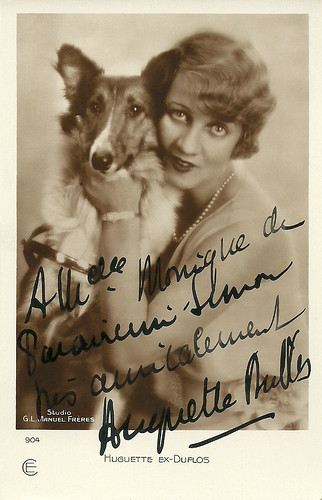
French postcard by Editions Cinémagazine (EC), no. 904. Photo: Studio G.L. Manuel Frères. Collection: Didier Hanson.
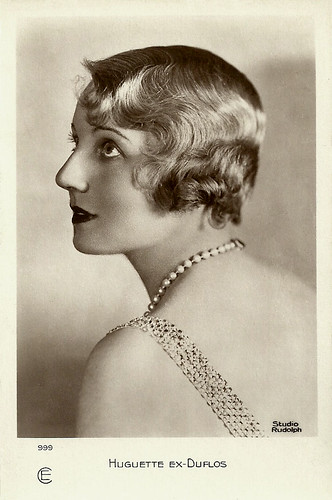
French postcard by Editions Cinémagazine, no. 999. Photo: Studio Rudolph.
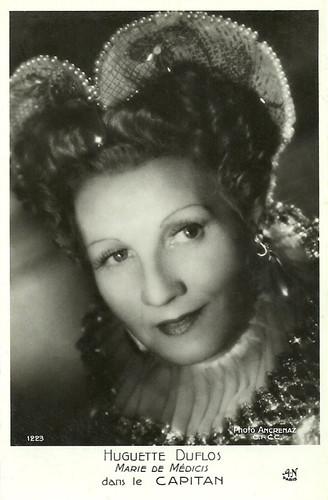
French postcard by A.N., Paris, no. 1223. Photo: Ancrenaz / C.F.C.C. Huguette Duflos as Maria de Medici in Le Capitan (Robert Vernay, 1946).
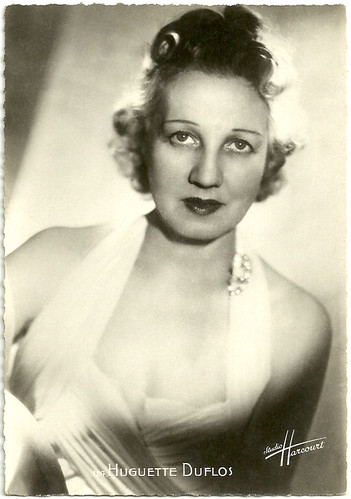
French postcard by S.E.R.P., Paris. Photo: Studio Harcourt.
Sources: Vittorio Martinelli, (Le dive del silenzio - Italian), Philippe Pelletier (CinéArtistes - French), Wikipedia (French), and IMDb.
This post was last updated on 1 February 2024.

Italian postcard by Ed. Traldi, Milano, no. 858.

French postcard in the Les Vedettes de Cinéma series by A.N., Paris, no. 16. Photo: Reutlinger.

Postcard by A.N., Paris, no. 155. Photo: V. Henri. Perhaps a card referring to Duflos' role as Princess Olga in La princesse aux clowns (André Hugon, 1924).

German postcard by Ross Verlag, no. 47/2.Photo: Bruckmann-Verleih / Robert Wiene-Produktion der Pan-Film A.-G., Vienna. Huguette Duflos and Jaque Catelain in the Austrian silent film Der Rosenkavalier (Robert Wiene, 1925), adapted from the opera by Richard Strauss with a libretto by Hugo von Hofmannsthal.

French postcard by Wyndham Ed., Paris, no. W 102.
Radiant youth
Huguette Duflos was born Hermance Meurs in Limoges, France, in 1887. She studied acting at the Conservatoire in Paris, first with Leloir, then with Raphaël Duflos. She married Duflos in 1910 and they divorced in 1928.
In 1912, she started to play at the Comédie Française. From 1915 on she was a Pensionnaire and had bigger roles.
However, when film director Henry Pouctal offered her a role in his film L'Instinct/The Instinct (1916) starring Raphaël Duflos, she eagerly accepted despite protests by her stage colleagues.
Eight years before, she had already made her film debut in the legendary Film d'art production L'assassinat du duc de Guise/The Assassination of the Duke de Guise (André Calmettes, Charles Le Bargy, 1908).
Her radiant youth, her expressive charme and her photogenic qualities were appreciated and would turn her into one of the most prolific stars of the French silent cinema.

French collector card (minicard) for Chocolat Félix Potin, third series, 1922. Photo: Reutlinger.
French postcard in the series Nos artistes dans leur loge by Editions La Fayette, Paris. Photo: Comoedia.

French postcard by A.N. (A.Noyer), Paris, no. 10. Photo: Henri Manuel. Caption: Huguette Duflos de la Comédie Française.

French postcard by Edition des Studios-Rahma, Paris. Photo: Huguette Duflos as Fleur-de-Marie in Les Mystères de Paris/The Mysteries of Paris (Charles Burguet 1922).

Italian postcard, no. 671. Photo: Huguette Duflos in Koenigsmark/The Secret Spring (Léonce Perret, 1923). Collection: Didier Hanson.

Italian postcard by A. Traldi, Milano, no. 674. Photo: Huguette Duflos in the silent film Koenigsmark (Léonce Perret, 1923).
French postcard.
International stardom
Huguette Duflos played in many films, from L'Ami Fritz/Friend Fritz (René Hervil, 1919) to Travail/Work (Henri Pouctal, 1919) with Léon Mathot, from Mademoiselle de la Seiglière (André Antoine, 1921) to the 12-part serial Les Mysteres de Paris/Mysteries of Paris (Charles Burguet, 1922).
Duflos magnificently performed the Grand Duchess Aurora in Léonce Perret's opulently staged Koenigsmark/The Secret Spring (1923), based on Pierre Benoit's popular novel and co-starring Jaque Catelain, Marcel L'Herbier's fetish-actor.
They played together again in Der Rosenkavalier/The Knight Of The Rose (Robert Wiene, 1925), which lifted her to international stardom. A huge success was Julien Duvivier's L'Homme à l'Hispano (1927), in which she is the rich lady who falls for a man who is ruined but has borrowed a fancy car.
At the advent of the sound era, Duflos went to the States to play opposite Charles Boyer in Le Procès de Mary Dugan (Marcel de Sano, 1931), the French version of The Trial of Mary Dugan (1930).
She also played in two early sound films by Marcel L'Herbier: Le mystère de la chambre jaune/The Mystery of the Yellow Room (1930) and Le Parfum de la dame en noir/Scent of the Woman in Black (1931). In the mid-1930s, she did only a few films. She rather played on stage in revues and comedies.

French postcard in the Les Vedettes du Cinéma Series by Editions Filma, no. 5. Photo: Films Eclipse.

Vintage postcard. Huguette Duflos and Jaque Catelain in Der Rosenkavalier (Robert Wiene, 1925).

French postcard by Europe, no. 188. Photo: Film Aubert. Huguette Duflos and Léon Mathot in the silent film drama Yasmina (André Hugon, 1927).

Italian postcard by Edizione E.F.A., A. Traldi, Milano, no. 949. Photo: Huguette Duflos in the French silent film drama Palaces (Jean Durand, 1927), released in Italy as Palace.

Italian postcard by Edizione E.F.A., A. Traldi, Milano, no. 950. Photo: Huguette Duflos in Palaces (Jean Durand, 1927).

Italian postcard by Edizione E.F.A., A. Traldi, Milano, no. 951. Photo: Huguette Duflos in Palaces (Jean Durand, 1927).
Deluded in Life
In the late 1930s and early 1940s, Huguette Duflos played again several film roles, such as Queen Hortense in Les Perles de la couronne (Sacha Guitry, Christian-Jacque, 1937) with Jacqueline Delubac.
Most of Huguette Duflos' sound productions were commercial mainstream films. One wonders what would have happened if she had had directors then like Abel Gance or Marcel L'Herbier who had guided her during the silent days?
A glimpse of that can be noticed in her sound film Maman Colibri (1937) with Jean-Pierre Aumont. In this film directed by the talented Jean Dreville, Duflos plays a woman in her forties who is deluded in life. She falls in love with a friend of her son, but he abandons her. Here, Duflos showed a memorable performance, leaving aside her usual aplomb and showing a real woman, with her bitterness, and her frustrations, up to her final humiliation.
After the war, Huguette Duflos continued to play in films and on stage, though less frequently. She played on stage in successful plays like Marcel Aymé's 'Clérambard', directed by Claude Sainval.
Her last film role was in Les Petits Matins/Hitch-Hike (Jacqueline Audry, 1962) with Gilbert Bécaud. Huguette Duflos died in 1982 in Paris.

French postcard in the Europe series, no. 1106. Photo: MGM. This card might be for her only American film, Le Procès de Mary Dugan (Marcel de Sano, 1931), the French version of The Trial of Mary Dugan (1930).

French postcard by Editions Cinémagazine, Paris, no. 40.

German postcard by Ross Verlag, no. 3613/1, 1928-1929. Photo: G.L. Manuel Frères. Collection: Didier Hanson.

French postcard by Editions Cinémagazine (EC), no. 904. Photo: Studio G.L. Manuel Frères. Collection: Didier Hanson.

French postcard by Editions Cinémagazine, no. 999. Photo: Studio Rudolph.

French postcard by A.N., Paris, no. 1223. Photo: Ancrenaz / C.F.C.C. Huguette Duflos as Maria de Medici in Le Capitan (Robert Vernay, 1946).

French postcard by S.E.R.P., Paris. Photo: Studio Harcourt.
Sources: Vittorio Martinelli, (Le dive del silenzio - Italian), Philippe Pelletier (CinéArtistes - French), Wikipedia (French), and IMDb.
This post was last updated on 1 February 2024.
No comments:
Post a Comment